
Today is...
The Amazing Gospel of
Garlic!
To use the word “gospel” is no heresy… after all, the word
"gospel" just means “Good News”
by Don Jíbaro
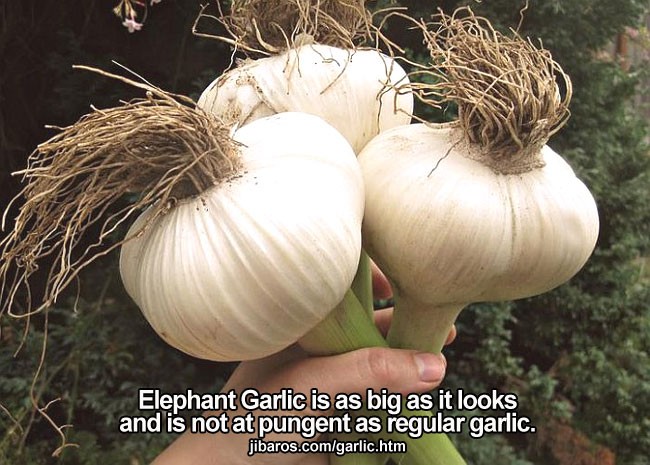
 hen I was a ten year old child in Puerto Rico sometimes I’d
eat dinner at my friend’s house next door, if I happened to
be there at dinner time. My friend’s mother cooked the most
delicious “arroz y habichuelas colorás” that I had ever
tasted. Yummee! That lady could cook! Her rice and beans
needed no meat! When I asked her how did she cooked such
tasty beans and if I could learn to cook like that, she said
her secret was “culantro y ajo” (coriander and garlic) but
the main ingredient was garlic. hen I was a ten year old child in Puerto Rico sometimes I’d
eat dinner at my friend’s house next door, if I happened to
be there at dinner time. My friend’s mother cooked the most
delicious “arroz y habichuelas colorás” that I had ever
tasted. Yummee! That lady could cook! Her rice and beans
needed no meat! When I asked her how did she cooked such
tasty beans and if I could learn to cook like that, she said
her secret was “culantro y ajo” (coriander and garlic) but
the main ingredient was garlic.
I was turned on to the marvelous world of Garlic by a
passage in the Bible where the Hebrews don’t want to follow
Moses anymore after he has given them the Ten Commandments.
Instead, they want to go back to Egypt where, as slaves,
they were kept strong for making bricks for the Pharaoh's
pyramids with a diet of “garlic”.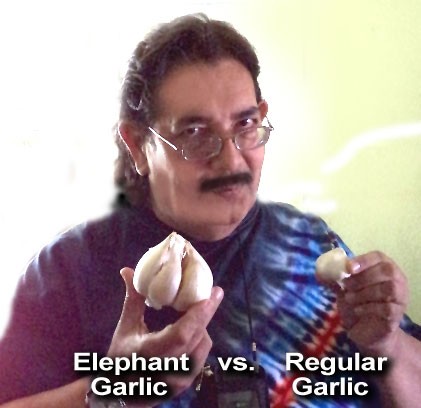
--"We remember the fish we ate in Egypt at no cost... also
the cucumbers, melons, leeks, onions and garlic. But now we
have lost our appetite; we never see anything but this
manna!"-- (Numbers 11:5-6)
Even back then, the ancient Egyptians knew that garlic was
an incredible health booster. They knew it had something
special. The claims of garlic as a miracle herb are not
supported by mere scientific evidence, but by people who
“been there-done that”.
Garlic (Allium sativum) is a bulbous herb of the lily family
(Liliaceae) and closely related to the onion. The plant
dates back 5000 years to the Middle East where it was one of
humanity’s first cultivated plants. Garlic is considered a
medicinal food and useful for fighting a myriad of diseases,
fighting parasites, detoxification, lowering fever and
relieving stomach aches, ect. It is also documented that
garlic helps to lower cholesterol, regulate blood sugar and
blood pressure, and function as a blood thinner much like
aspirin.
Allicin is the chief component of this incredible herb. The
compound is a strong antibacterial agent and released when
its bulbs are crushed or cut. Garlic contains 32 additional
sulfur compounds and 17 amino acids. The main active
components are allicin, allixin, diallyl disulfide, diallyl
trisulfide, and thioallyl amino acids1.
Prevalence of Use
According to a 2003 market survey of herbal sales, garlic is
one of the top 3 best selling supplements of this estimated
$5.2 billion industry. Estimated
Cost/Expenditure/Reimbursement Individual garlic bulbs can
be purchased for pennies or grown in one’s own garden.
Bulk rate per pound $8.39
250 100% pure garlic caplets $17.89 (Quintessence)
60 ml aged garlic extract $12.89
100- 500 mg caplets $6.99 to $8.39
So… meet the much maligned garlic…
Garlic is a member of the lily family and a close relative
of the onion. The plants have flat, grayish-green leaves,
which grow to be a foot or two tall. During their bloom
period, the plants send up slender stalks which produce
edible flowers in a round, snowy-white head. Sometimes tiny,
edible bulbs show up among the flowers. The leaves, or
“chives”, are an xcellent addition to salads and stews, but
the part of the garlic plant revered in song and story and
treasured over the centuries is the bulb. A single bulb is
composed of 8 to 12 sections called cloves, which are held
together by a parchment-like covering.
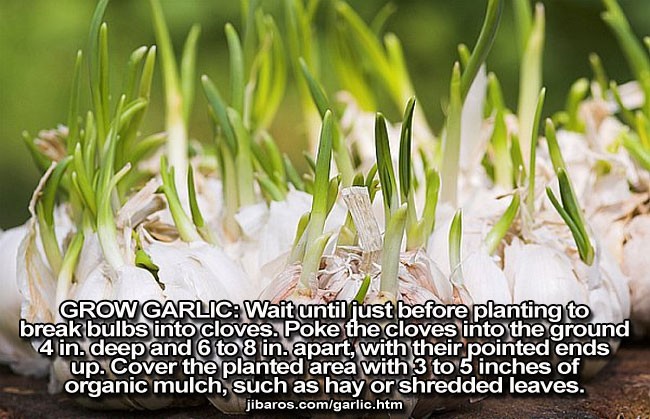
Historically speaking, as early as 3000 B.C. Chinese
scholars were writing the praises of garlic and it is
mentioned in the earliest Sanskrit writings. The sacrificial
lambs of China were seasoned with garlic to make them more
acceptable to the gods. Garlic was of such value to the
Egyptians that fifteen pounds of it would purchase a healthy
male slave. From the translations of the works of the Greek
Historian, Herodotus, we know that the workers constructing
the Great Pyramid at Giza lived mainly on garlic and onions.
It is reported that pyramid builders, although surrounded by
savage taskmasters, went on strike when deprived of their
ration of garlic.
 The Israelites, wandering in the Sinai desert with nothing
but manna to keep them from starvation, complained bitterly
at the absence of garlic in their diets. They thought
longingly of spicy foods they had left behind, “the fish
which they did eat, the leeks and the onions and the garlick.”
The Israelites, wandering in the Sinai desert with nothing
but manna to keep them from starvation, complained bitterly
at the absence of garlic in their diets. They thought
longingly of spicy foods they had left behind, “the fish
which they did eat, the leeks and the onions and the garlick.”
 The early Sumerian diet included garlic as a mainstay and
garlic is also mentioned in the Shih Ching (The Book of
Songs), a collection of traditional ballads, said to have
been written by Confucius.
The early Sumerian diet included garlic as a mainstay and
garlic is also mentioned in the Shih Ching (The Book of
Songs), a collection of traditional ballads, said to have
been written by Confucius.
 In the eighth century, B.C., garlic was found growing in the
garden of the
King of Babylon.
In the eighth century, B.C., garlic was found growing in the
garden of the
King of Babylon.
 Homer praised garlic.
Homer praised garlic.
 The Vikings and Phoenicians packed it into their sea chests
for long
voyages, and in Boccaccio's Decameron a love stricken young
man sent garlic
to his lady in order to win her love,- and he did!
The Vikings and Phoenicians packed it into their sea chests
for long
voyages, and in Boccaccio's Decameron a love stricken young
man sent garlic
to his lady in order to win her love,- and he did!
 Crusaders, returning to Europe from battle, are credited
with moving garlic
to the continent. Marco Polo mentioned the many uses of
garlic in records of
his journeys.
Crusaders, returning to Europe from battle, are credited
with moving garlic
to the continent. Marco Polo mentioned the many uses of
garlic in records of
his journeys.
 So popular did this "lily" become in Europe that banquet
guests were
required to compose verses saluting it.
So popular did this "lily" become in Europe that banquet
guests were
required to compose verses saluting it.
After being revered and loved by the common people for
centuries, at the beginning of this century garlic suffered a decline and
became regarded as
slightly improper by the bourgeois households of both
America and England.
By the end of World War II it was found only in gourmet
shops.
Still valued as medicine, garlic has made a splendid
comeback as a food
flavoring in recent years. Informal postwar entertaining
began to include
salad bowls gingerly rubbed with a glove of garlic and even
more daring,
garlic bread was served. Much of this is believed to have
been brought about
by Americans traveling in European countries. Today whole
heads are baked
and served with crusty bread as an appetizer.
Garlic has a pungent smell, and is good in certain dishes, but
is there more too it? Why is garlic so often considered a great,
healthy herb? Well, for one, it has the vital chemical compound
allicin, which is a wonderful therapeutic ingredient with many
medicinal qualities. The allicin compound contains sulfur, which
gives the garlic its pungent savor and peculiar smell. The
health benefits of garlic are innumerable. It helps fight heart
ailments, fight cold, cough, and lowers blood pressure.
Garlic is the oldest known medicinal plant variety or spice in
existence. Mankind recognized the curative qualities of this
magic herb over 3,000 years ago. Sir Louis Pasteur, the
scientist who discovered penicillin, effectively utilized the
anti-bacterial qualities of garlic all the way back in 1858.
World War I medical surgeons used the health benefits of garlic
juice as an antiseptic for treating war wounds. Garlic contains
useful minerals such as phosphorous, calcium and iron, as well
as trace minerals like iodine, sulfur and chlorine, which are
also present in the cloves. In terms of organic compounds,
garlic is one of the rare sources of allicin, allisatin 1, and
2.
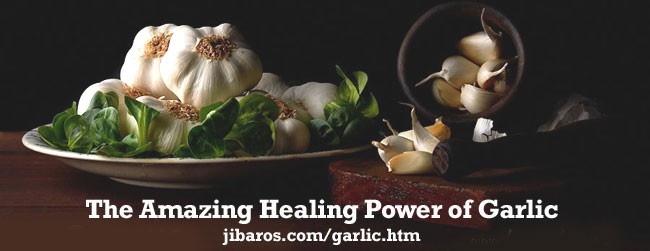
Health
Benefits of Garlic
Some of the health benefits of garlic are explained in greater
detail below.
Diabetes: Diabetes can harm the kidneys, inhibit nervous
system functions, cause heart disorders, and even lead to poor
eyesight. The oil extracted from garlic may protect diabetic
patients from these side effects.
High Cholesterol Levels: Of the two kinds of cholesterol
–LDL and HDL, the former is bad for human health. Garlic, rich
in the allicin compound, effectively prevents LDL cholesterol
from oxidizing. All those who have high cholesterol levels
should include garlic in their daily diet.
Hypertension: Garlic is an herbal ingredient for curing
hypertension. When exposed to high levels of pressure, the
allicin present in garlic relaxes the blood vessels. Garlic also
fights against thrombosis by reducing platelet aggregation.
Digestion: Daily inclusion of garlic in your diet aids in
eliminating any digestive problems. Garlic assists in the normal
functioning of the intestines for good digestion. Even swelling
or irritation of the gastric canal may be rectified with garlic
as a treatment.
Eye Care: Garlic is rich in nutrients like Selenium,
Quercetin and Vitamin C, all of which help treat eye infections
and swelling.
Ear Aches: Garlic is commonly used for curing ear aches,
as it has several antiviral, antifungal and antibiotic
properties. Garlic oil can be made at home by squeezing the
juice of garlic cloves and adding it to olive oil. The mixture
should be kept at room temperature for a few days, but shouldn’t
be saved indefinitely, if made at home.
Intestinal Problems: Garlic clears up most intestinal
problems like dysentery, diarrhea and colitis. Its role in
dispelling worms is phenomenal. It does not affect the
functioning of useful organisms in the intestine, which aid in
digestion, but it does destroy the harmful bacteria present in
the intestines.
Cold: Raw garlic is used to treat colds and coughs. At
the very onset of a cold, you should eat at least two cloves of
crushed garlic, which will thereby help in lessening the
severity of your cold.
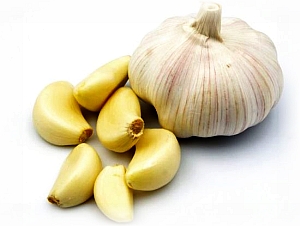 Infected Wounds:
Garlic can be placed on infected wounds
as an herbal treatment. It should be mixed with three drops of
water, rather than using it in raw form, as the undiluted juice
can irritate the skin. Infected Wounds:
Garlic can be placed on infected wounds
as an herbal treatment. It should be mixed with three drops of
water, rather than using it in raw form, as the undiluted juice
can irritate the skin.
Acne: Half the people in the world suffer from mild to
severe forms of acne. Garlic may be used, along with other
ingredients like honey, cream and turmeric, to treat acne scars
and prevent the initial development of acne. Garlic acts as a
cleanser and an antibiotic substance for soothing skin rashes.
Asthma: Boiled garlic cloves are wonderful as an
alternative asthma treatment. Each night before going to sleep,
a glass of milk with 3 boiled cloves of garlic can bring
subsequent relief for patients with asthma. The asthma attacks
may be brought under control by having crushed garlic cloves
with malt vinegar as well.
Sexual Problems: Garlic has certain aphrodisiac
properties, so this helpful herb can be utilized as an effectual
sex rejuvenator. The health benefits of garlic are further known
to enhance the libido of both men and women. People who
overindulge in sexual activities should consume garlic in their
diet or in supplemental form to protect themselves from nervous
fatigue.
Cancer: The regular intake of garlic reduces the risk of
colon, stomach and esophageal cancer. It aids in reducing the
production of carcinogenic compounds, and also reduces the
occurrence of tumors associated with breast cancer.
More Info on This Wonderful Herb
The health benefits of garlic were realized centuries ago by
mankind. Garlic is very effective when eaten raw- either crushed
or chopped. As little as one clove per day may bring vast
improvement in your overall health. 2 to 3 cloves could prevent
an attack of the common cold. Garlic used in cooking should be
added last for more of a healthy impact.
However, consuming too much garlic is also not very good as it
may cause irritation in the digestive system. Garlic should be
added as a part of a healthy normal diet, it does not need not
be used as an alternative to anything. The only drawback is its
pungent smell and taste that leaves bad breath, but other than
that, garlic is a medicinal boon for mankind!
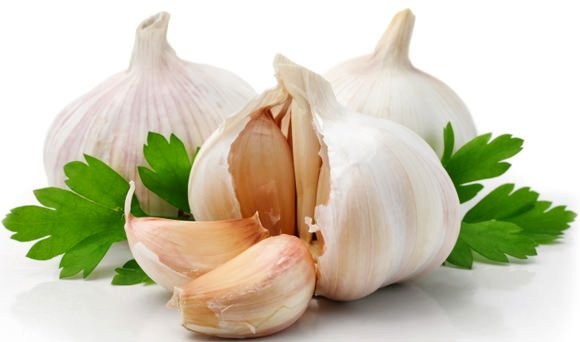


Peace and Prosperity!

donjibaro@gmail.com

“Live in such a way that no one blames the rest
of
us
nor finds fault with our work.” —(2 Corinthians
6:3)
  |
|